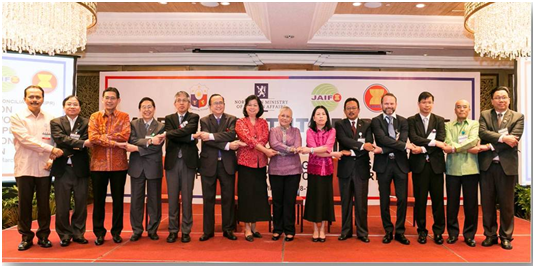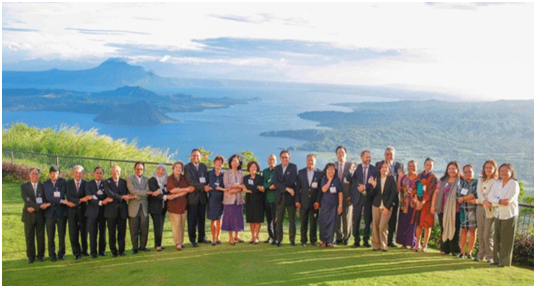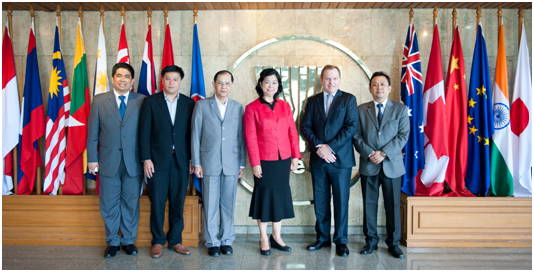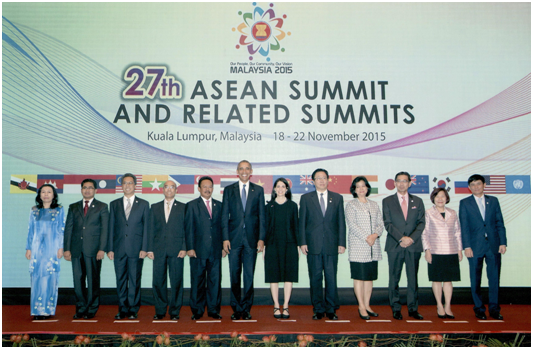Executive Summary
The Philippine Permanent Mission to ASEAN (Jakarta PM) was established in Jakarta in 2009 in accordance with ASEAN Member States’ commitment to appoint a Permanent Representative to ASEAN with the rank of Ambassador, as enshrined in the ASEAN Charter. As the depth and breadth of ASEAN’s work has expanded, however, the roles and responsibilities of both the Permanent Representative and the Mission have grown as well.
In 2015, the Mission attended a total of 339 meetings where it championed the advocacies of the Philippines and contributed to the growth of ASEAN, in line with its mandate to further Philippine interests through the work of the Committee of Permanent Representatives (CPR) to ASEAN, the ASEAN Connectivity Coordinating Committee (ACCC), the Initiative for ASEAN Integration (IAI) Task Force, the Board of Trustees of the ASEAN Foundation (AF), and the Governing Council of the ASEAN Institute for Peace and Reconciliation (AIPR). H.E. Elizabeth P. Buensuceso, the Philippine Permanent Representative to ASEAN, and other Mission officials also took part in 84 additional functions and activities with other ASEAN Member States, Dialogue Partners, and other External Parties.
Key Philippine advocacies supported in 2015 include:
1. Peace and Reconciliation

Presidential Adviser on the Peace Process TeresitaQuinots-Deles with Foreign Affairs Undersecretary Evan P. Garcia, Permanent Representative of the Philippines to ASEAN Ambassador Elizabeth P. Buensuceso, and members of the AIPR Governing Council.
In line with the Philippines’ desire to contribute to peace and reconciliation efforts in the region, particularly through the sharing of best practices and experiences on peace processes, the Mission organized the ASEAN Institute for Peace and Reconciliation (AIPR) Workshop on Strengthening the Participation of Women in Peace Processes and Conflict Resolution in Cebu City on 18-19 March 2015 and the AIPR Symposium on the Plight of Women and Children in Conflict Situations in Tagaytay City on 8-9 December 2015.

Heads of Delegation, speakers, moderators, members of the AIPR Governing Council and Ambassadors pose for a group photo overlooking Taal Lake in Tagaytay City.
Among the key recommendations of the two conferences are: (1) AIPR should continue to provide a platform to discuss women’s participation in peace processes and conflict resolution; (2) AIPR should organize trainings and workshops for women to become peace mediators; (3) AIPR should consider organizing an ASEAN network of women on peace and security, including a pool of experts on peace mediation; (4) AIPR should consider establishing a “knowledge hub” of resources related to peace; and (5) ASEAN Member States should continue undertaking activities to formulate policy recommendationsto address the needs of women and children in conflict and post-conflict situations; and (6) ASEAN should support the development of preventive measures to conflict. This can be implemented through activities and initiatives in education, culture, human rights, and political-security, among others, under the various ASEAN-led mechanisms.
2. Philippine Coordinatorship of ASEAN-Australia Dialogue Relations
In line with the Philippines’ role as Country-Coordinatorfor ASEAN-Australia Dialogue Relations, the Mission organized the9th Joint Planning and Review Committee (JPRC) Meeting of the ASEAN-Australia Development Cooperation Program Phase II (AADCP II) on 3 March 2015 at the ASEAN Secretariat. In addition, Mission provided support for Secretary of Foreign Affairs Albert F. Del Rosario when he co-chaired the ASEAN Post Ministerial Conference +1 Session with Australia with the Hon. Julie Bishop MP, Minister for Foreign Affairs of Australia, in Kuala Lumpur on 5 August 2015.

Ambassador Elizabeth P. Buensuceso and Ambassador Simon Merrifield, co-chairs of the 9th JPRC meeting of AADCP II, with other participants in the meeting.
The Meeting welcomed the Commemoration of the 40thAnniversary of ASEAN-Australia Dialogue Relations and the elevation of ASEAN-Australia Dialogue Relations to a Strategic Partnership. In recognition of the Strategic partnership, the Meeting agreed to convene biennial Leaders’ Summits, beginning in 2016. The Meeting also condemned the acts of the Islamic State and shared the view that the issue of international terrorism should be addressed in a comprehensive manner. The Meeting also underlined the importance of maintaining peace, security and stability, freedom of navigation in and over-flight above the South China Sea.
3.Philippine Coordinatorship of ASEAN-Canada Dialogue Relations
The Philippines received the turnover of the Country Coordinatorship for ASEAN-Canada Dialogue Relations for the next three years from Singapore during the ASEAN Post-Ministerial Conference +1 with Canada in Kuala Lumpur on 5 August 2015. The meeting, moreover, adopted the Plan of Action to Implement the Joint Declaration on the ASEAN-Canada Enhanced Partnership (2016-2020).
Since the turnover, the Mission has met several times with the Canadian Mission to ASEAN in Jakarta to discuss ways to move the relationship forward, including by improving Member States’ familiarity with Canada’s development cooperation mechanisms with ASEAN, implementing the ASEAN-Canada Joint Agreement on Trade and Investment and its 2016-2020 Work Plan, and exploring greater cooperation on environmental and biodiversity management as well as the possibility of developing an ASEAN-Canada Regional Air Services Agreement to improve connectivity between Canada and the region.
4. Rule of Law

The Ambassadors of ASEAN and the USA finalized the elevation of the United States to a Strategic Partner of ASEAN as well as the Plan of Action to Implement the ASEAN-U.S. Strategic Partnership (2016-2020).
The Mission actively participated in the negotiation of the new Plans of Actions (POAs) with ASEAN Dialogue Partners Canada, China, India, New Zealand, Republic of Korea (ROK), and the United States. The Mission advocated and succeeded in including action lines related to the maritime security cooperation and the peaceful settlement of disputes in accordance with international law, including the 1982 UNCLOS, as well as the full and effective implementation of the Declaration on the Conduct of Parties in the South China Sea (DOC) in its entirety, and the expeditious conclusion of a Code of Conduct in the South China Sea (COC) in all the POAs.
5. Migrant Workers
The protection of the rights of migrant workers was also enshrined in almost all the newly completed Plans of Actions with ASEAN Dialogue Partners including Canada, China, New Zealand, the Republic of Korea (ROK), and the United States, an advocacy that the Philippines has consistently pushed in various ASEAN-led mechanism.
6. Regional Security Architecture
The Mission actively participated in the Ad Hoc East Asia Summit (EAS) Ambassadors’ meetings in Jakarta on national, regional, and international efforts to counter the threats of ISIL and foreign terrorist fighters and on strengthening the EAS on the occasion of its 10th anniversary. During the meetings, Mission discussed the various steps that the Philippines has taken to combat ISIL and the rise of violent extremism and supported the strengthening of the EAS as the region's premier Leaders-led forum for strategic, political and security issues, in line with the position taken by the Philippines at the 5th East Asia Summit (EAS) in Kuala Lumpur on 6 August 2015.
7. Raising the Profile of ASEAN
The Mission also supported ASEAN's efforts to build more linkages with external partners and raise its profile in the international community by facilitating the accreditation of 84 non-ASEAN Member State Ambassadors to ASEAN and the accreditation of four ASEAN Committees in Third Countries (ACTCs) in Bucharest, Rahbat, The Hague, and Tehran. The growing interest of Non-ASEAN Member States in ASEAN reflects the latter’s increasing relevance to the rest of the world even as ACTCs work to promote awareness about and understanding of ASEAN in countries outside Southeast Asia.
8. Election Observation Workshop
The Mission also supported the initiative of the DFA-Office of ASEAN Affairsand the Commission on Elections (COMELEC), in partnership with the Institute for Democratic and Electoral Assistance (IDEA) and the Republic of Korea (ROK), to host the first ever ASEAN Workshop on Election Observation in Makati City on 24-25 June 2015. The workshop successfully implemented its objective to discuss the basic principles and issues involved in election observations and to share best practices and principles to be able to deliver credible, legitimate, and satisfactory election results to the people. Without prescribing a one-size-fits-all formula given the diverse political systems, economic and socio-cultural backgrounds of ASEAN members states, the workshop succeeded in convincing participants about the desirability of factoring in election observation in their democratic processes while pointing to the need for both election management bodies and election observers to establish a mutually beneficial, friendly, rather than adversarial, modus vivendi.
9. People-Centered ASEAN and Engagement with CSOs
The Philippines continued its advocacy for active engagement with civil society organizations (CSOs) in a people-centered, people-oriented, and rules-based ASEAN. The Philippines, through the Philippine Mission to ASEAN in Jakarta, participated in the ASEAN People’s Forum at the sidelines of the 26th ASEAN Summit and Related Meetings in Kuala Lumpur on 23-25 April 2015. This is consistent with the Philippine position to support interaction and consultation among relevant ASEAN Sectoral Bodies and other stakeholders, including CSOs, on various issues, including the promotion and protection of human rights.
In relation to the above, Jakarta PM submitted a total of 240 policy advice and recommendations related to ASEAN to the Philippine Department of Foreign Affairs last year.
Ambassador Buensuceso, moreover, acted as speaker, resource person and/or moderator in various forums and events to raise awareness about ASEAN and bring ASEAN to the people.
In addition, Mission actively participated in discussions, workshops, and other events to prepare for the Philippine Chairmanship of ASEAN in 2017.
Mission also monitored and facilitated the Philippines’ endorsement of 108 ASEAN projects in 2015 as the latter were subjected to the ASEAN Secretariat’s project appraisal and approval process. Of the said projects, ten were initiated by the Philippines.
Administrative Developments
In 2015, the Mission said good-bye to three of its members and welcomed two new personnel to the JPM Team. In addition, two of Mission’s officers were promoted from the rank of Foreign Service Officer Class III to Foreign Service Officer Class II.
Fiscal Matters
Mission’s total expenditures for Personal Servicesfor FY 2015 amounted toUSD 782,097.53.
For Maintenance and Other Operation Expenses, Mission’s total expenditures for FY 2015 amounted to USD 475,973.43.

